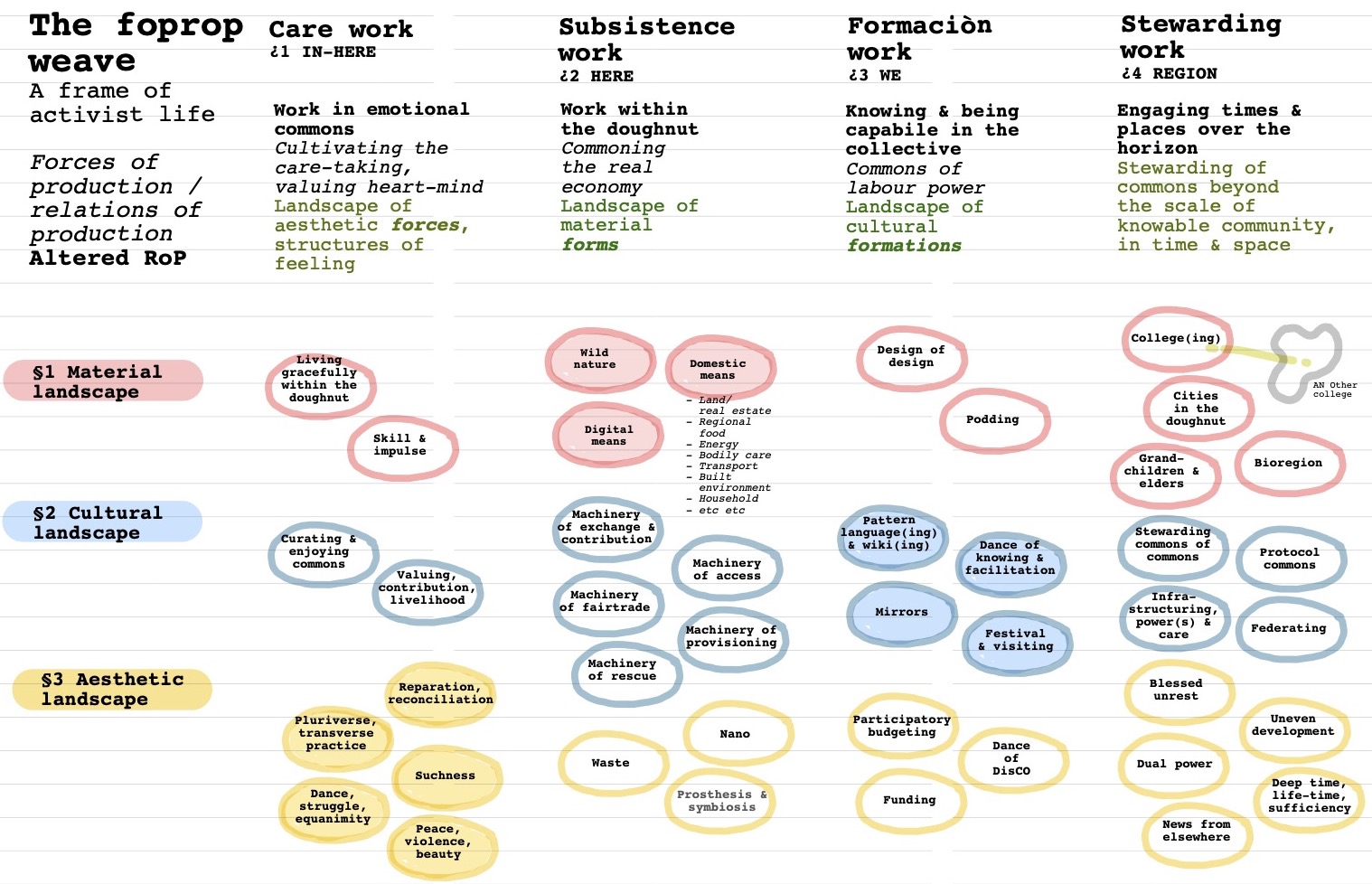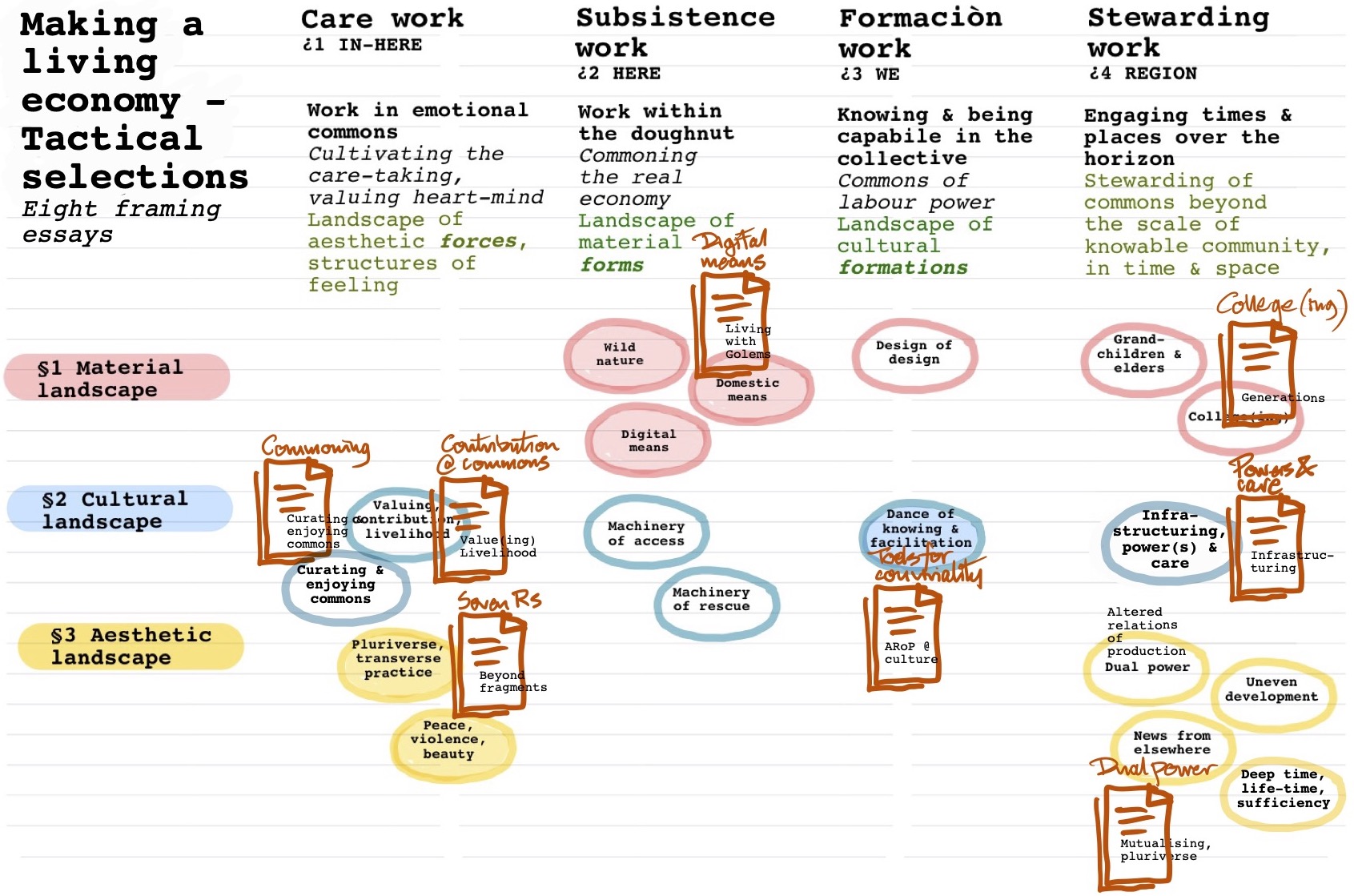Here we outline a possible constellation of pattern families within the foprop weave framework and, based on that, a strategic selection of fields to begin conversations and explorations.
# A pattern language of activist practce
It will take plenty of time, plenty of diversity in experience 'across the fragments' of our movements, and plenty of engaged and respectiful conversation, to determine what patterns are really solid and pivotal. Developing a pattern language happens in evolutionary time; it's not a sprint.

Starting hunches about pattern families in the foprop weave - Overview
But joining-up across fragments of knowhow, influence, insight and locale is urgent business in a time of deep social, economic and aesthetic crisis. So some bootsrtapping strategy is called for. Let's make a tactical selection of fields, to begin to learn how to do the conversations across such a large and pluriversal community-of-communities.
# A tactical selection of issues Rather than attempt to jump in with patterns, we'll start with exploring the framing, and the nature of cross-linking across families, zones and landsacpes: as a matter of conversational and small-p political practice.
A number of broad narrative themes will be adopted for starters: seven, as it happens. Some of them map closely on to anticipated pattern families and some are clearly gathering together a number of families. Each selected theme is the focus of its own wiki. Links across themes will need to be handled as links across wikis: one means of achieving this is through \<category> tags.
Here we assemble categories deployed in the foprop family of wikis and describe a coding scheme.
The wikis - together with two overview wikis - are:
Framework
Here we describe the foprop weave - a framework or 'container' or architecture, for patterns of activist capability in making a living economy.
Here we describe the way we mean to get started in developing the foprop narrative. The aim is to foreground the particular way foprop focuses on activist practice in making the living economy.
Thematic wikis
Here we develop the perspective of making a living economy through activity in the commons, as a practice of dual power. The powers are dual because the practice embodies altered relations of production in economic, cultural and aesthetic landscapes.
Here we engage with the means of visioning and enacting pluriversal relations in making a living economy. A framing of 'seven Rs' of activist commitment underpins a commitment to design justice in the cultivation of infrastructure and tools.
Here we develop a perspective on altered relations of cultural production - practices of knowing and capability - in terms of tools for conviviality. These oppositional forms of cultural production have emerged historically in struggles under capitalism, patriarchy, hijacking by professionals, colonisation, extractivism, consumerism, statism and other modes of supremacy.
Here we develop a perspective on contribution in the commons, as a basis for making a living economy that escapes dominant relations of property, ownership and value-extraction. This includes issues of livelihood and also appropriate recognition of contributions.
Here we develop the core principle of infrastructuring in the commons as a basis of a living economy. Infrastructuring is an 'over the horizon' perspective, to be placed alongside - and in parity with - the matching principle of care work: meeting the clear and present needs of actual people, 'here'. Also we highlight federating as a basic way of provisioning infrastructure.
Here we explore crucial roles - positive and negative - of digital means in making a living economy in the 21st century. We develop an activist perspective on the challenge of living well among golems.
Families of patterns
Here we assemble patterns in the foprop pattern language. At this stage we work only at the level of pattern families. Evolving the language calls for time and diverse community.
The schema below shows the selected themes, and sketches anticipated cross links between thematic wikis.

A tactical selection of issues - Seven thematic narrative wikis
# Rationale The rationale for this selection of themes is constructed in terms of: - A living economy - Formación - An intention of justice - An aspiration for peace The rationale is developed in its own wiki: Tactics in the foprop project
Here we describe the way we mean to get started in developing the foprop narrative. We select a number of foci from within the broad foprop weave, spanning the four zones of reach, and also the three landscapes of practice. The aim is to foreground the particular way foprop focuses on activist practice in making the living economy.
---
DOT FROM preview-next-diagram STATIC strict digraph {rankdir=LR node [style=filled fillcolor=lightyellow penwidth=3 color=black fontname="Helvetica"] "Tactical selection of issues" node [style=filled fillcolor=lightblue] node [style=filled fillcolor=white penwidth=3 color=black] "Tactical selection of issues" -> "Tactics in the foprop project" node [style=filled fillcolor=white penwidth=1 color=black] node [style="filled,rounded,dotted" fillcolor=white] edge [style=dotted] "Tactical selection of issues" "A framework - The foprop weave" -> "Tactical selection of issues" "Making the living economy - the foprop weave" -> "Tactical selection of issues"}